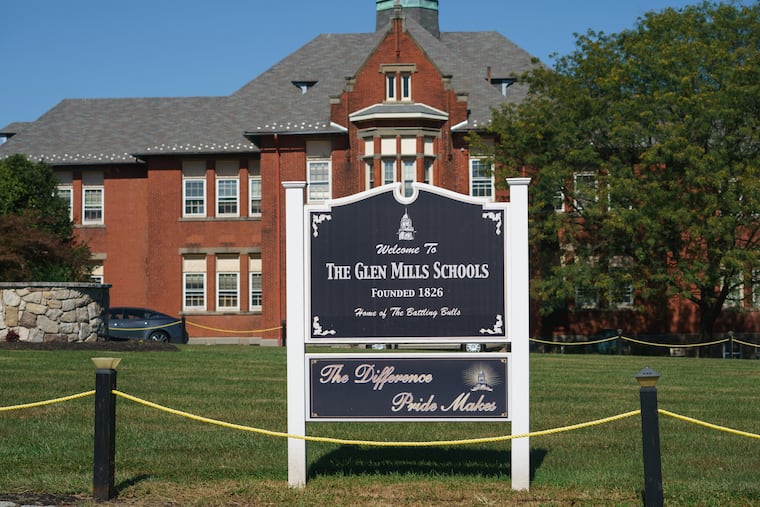Former Glen Mills students reach $3 million settlement with Chester County Intermediate Unit in abuse lawsuit
The settlement comes nearly four years after Pennsylvania revoked Glen Mills’ license in response to an Inquirer investigation that revealed decades of violence against boys sent to the school.

Former students suing the Glen Mills Schools and local and state agencies over systemic abuse at the now-shuttered reform school have settled with the Chester County Intermediate Unit for $3 million.
The agreement, announced late Wednesday, comes nearly four years after Pennsylvania revoked Glen Mills’ license in response to an Inquirer investigation that revealed decades of violence against boys sent to the school in Delaware County.
» READ MORE: Beaten, then silenced
“These young adults experienced and witnessed abuse and were left to languish in an ineffective, self-directed credit recovery program or diverted to a GED path, while the hope of obtaining a high school diploma slipped away,” said Maura McInerney, legal director at the Education Law Center, which is representing plaintiffs in the class-action lawsuit. “They need access to resources now to change their futures.”
Still, the agreement is just a first step, McInerney and other plaintiffs’ lawyers said — and not enough to compensate former students for their experience at what had been the nation’s oldest juvenile justice facility before it was closed amid the abuse and cover-up scandal.
The settlement didn’t resolve other claims in the ongoing lawsuit, which was also filed against Glen Mills, former school officials and employees, and the Pennsylvania Departments of Education and Human Services, alleging violations of students’ civil rights.
The Chester County Intermediate Unit, which had a contract with Glen Mills to educate children at the school, didn’t have any administrative control over Glen Mills’ operations and had a “peripheral” role with regard to the school, said Andy Faust, a lawyer for the intermediate unit. While some intermediate unit employees were providing group instructional support for students with special needs at Glen Mills, “they did not observe in any of those roles any of the abuse being alleged in the complaint,” Faust said.
» READ MORE: Glen Mills Schools seeks to reopen under a new name two years after child-abuse cover-up scandal closed it
The Inquirer investigation relied on the accounts of 21 current and former students and counselors at the time, who detailed school staffers throwing punches and breaking boys’ bones to punish them for violating school rules. One boy said he was beaten and choked for running away. Another student suffered a broken jaw over a joke about a counselor’s sister.
The Inquirer reported in 2019 that beatings of boys by Glen Mills staff were an “open secret” and that staff tried to stop students and their families from reporting the attacks, threatening that Glen Mills would instead send the boys to a different state-run facility with boys who were mentally ill or had committed sex offenses. Courts across the country then pulled boys from Glen Mills, and Pennsylvania’s Department of Human Services revoked the school’s license.
The lawsuit that led to Wednesday’s settlement followed. About 1,600 former students may be eligible for a share of the money, according to the Education Law Center, which said two funds would be created: one to provide compensatory education, and the other, cash payments.
Anyone who attended the school during a specific time frame — after April 11, 2017, or those who attended before then but hadn’t turned 20 by April 11, 2019, the date the lawsuit was filed — could file a claim with the compensatory education fund, with money that could be used for tutoring, therapy, mental health services, and technology, among other options.
Those who experienced or witnessed abuse at the school, meanwhile, could also seek cash payments through the damages fund. Former students have a year to file claims, which will be based on the number of days they spent at the school; how much money they may receive will depend on the number of people who come forward.
“The environment where children were learning undermined their ability to move forward,” McInerney said during a news conference Thursday. “You didn’t have certified teachers. ... You had them on a one-size-fits-all credit recovery program only.” Witnessing abuse and trauma, she added, “also undermines learning.”
Those seeking information about eligibility can visit GlenMillsSettlement.org, email Help@GlenMillsSettlement.org, or leave a message at 267-515-6853.
“The well-being of the youth and young adults formerly served at the former Glen Mills Schools remains of paramount concern,” said Joe McHale, an attorney for the former Glen Mills Schools. “It would be inappropriate at this time to provide any further comment given the litigation is ongoing and the settlement agreement announced today involves parties other than the Glen Mills Schools.”
The school had sought to reopen under a new name, Clock Tower Schools, applying in 2021 to the Pennsylvania Department of Human Services for a license. The department denied the request, though Clock Tower Schools “as a new entity altogether is still interested in receiving a new license” to operate on the former Glen Mills campus, spokesperson Jeff Jubelirer said Thursday.
Spokespeople for the Education and Human Services Departments declined to comment Thursday on the settlement, citing the pending litigation.
The Inquirer found in a follow-up investigation, also in 2019, that Pennsylvania’s oversight of Glen Mills and other privately run juvenile programs “has been bare-bones at best and negligent at worst,” with repeated complaints about violence at the school going ignored or unsubstantiated.
Of the settlement with the Chester County Intermediate Unit, “we hope it will inspire the other defendants to step forward and do the same thing,” Marsha Levick, chief legal officer with the Juvenile Law Center, which is also representing plaintiffs, said during a news conference Thursday.